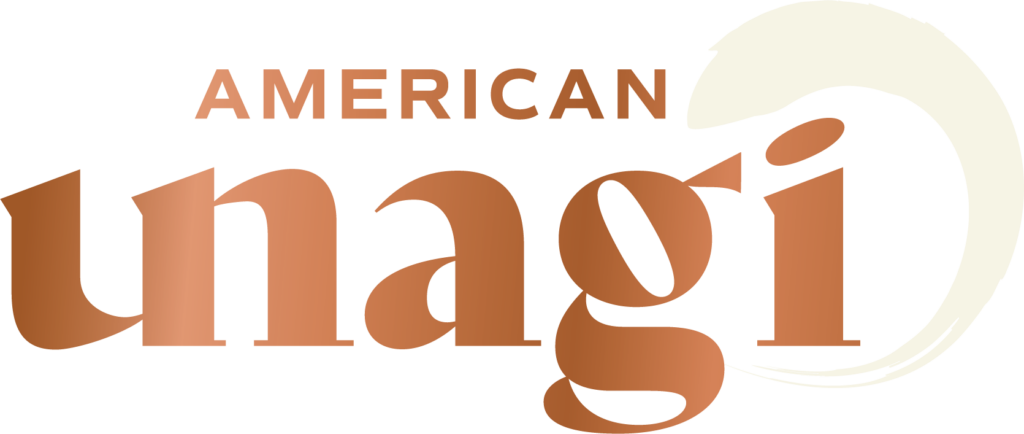On March 22nd, the NDN Fund and NDN Tactical Media team journeyed to so-called Maine to learn about the impact of the NDN Fund’s CDFI loan of $1.57 M into a project known to us as the “eel deal.” The Passamaquoddy Tribe at Indian Township applied for the loan to revitalize traditional eel harvesting practices and to invest in a sustainable eel aquaculture farm called American Unagi.
In addition to securing loan capital, NDN Fund, the investing and lending arm of the NDN Collective, utilizes a braided capital approach. “For us, it’s about relationship management and we will do everything we can to make sure our loan relatives are successful. We do not do this type of work for the revenue or interest repayments, we do this type of work because it’s so vital and needed in Indian Country,” said Tawny Wilson, Sicangu Lakota, Director of Lending at NDN Fund. To help solidify the eel deal’s financial sustainability and resiliency, NDN Fund offered capacity-building and power-building resources, a service provided to each loan relative.
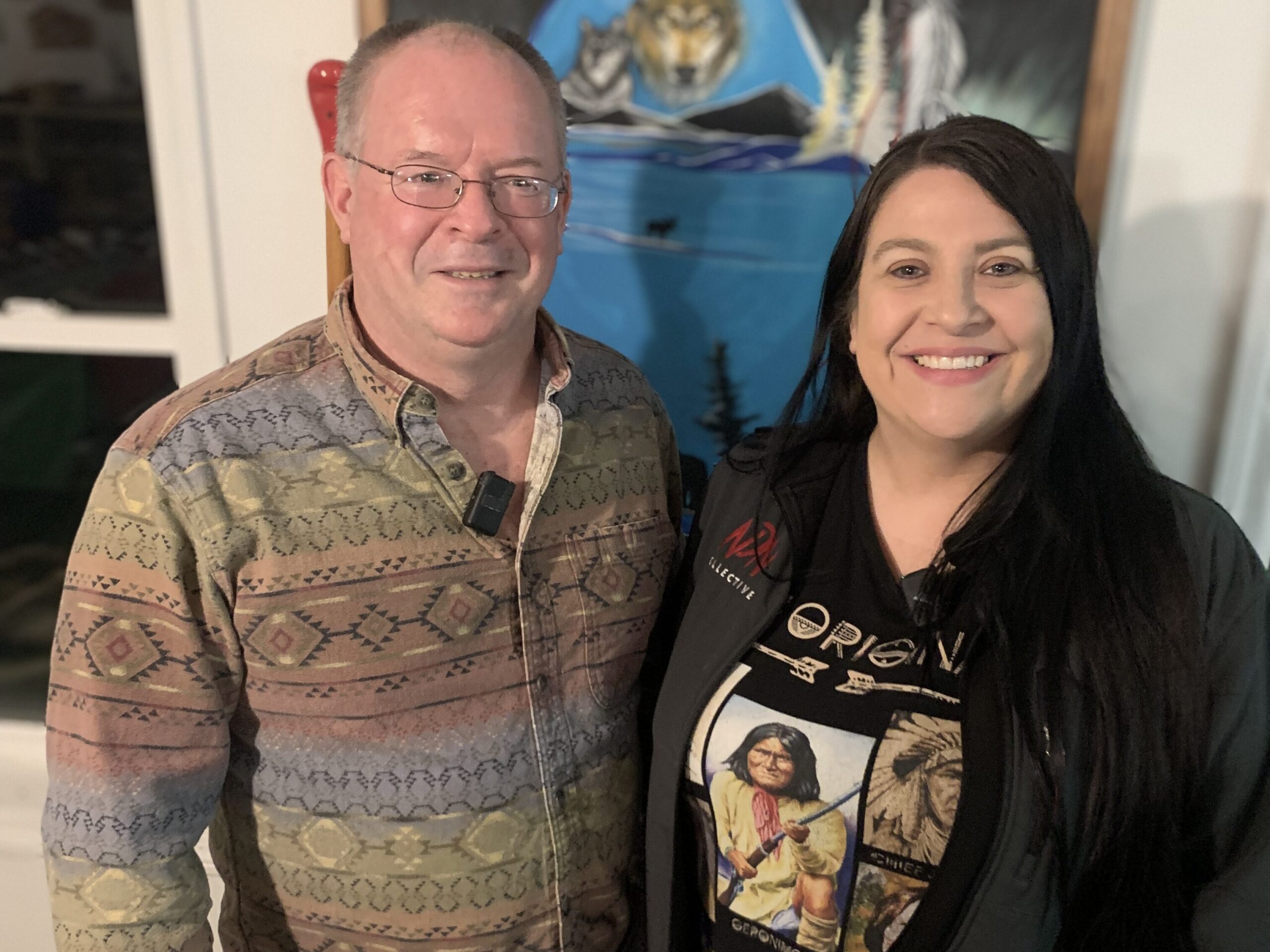
When we arrived in so-called Maine we were guided by our host, Stan Meader, an enrolled citizen of the Passamaquoddy Tribe at Indian Township who worked with NDN Fund since the eel deal’s inception. Before NDN Fund’s investment, Stan met with 25 different banks, investors, and venture capitalists across Turtle Island and they weren’t interested. Without tribal sovereignty and access to federal funding streams, the project was seemingly risky. When asked how NDN’s CDFI is different than most, Stan stated, “Tawny and her team had a level of empathy and experience in Indian Country that no one else has,” Stan continued, “We never would have been able to get this project together without NDN.”
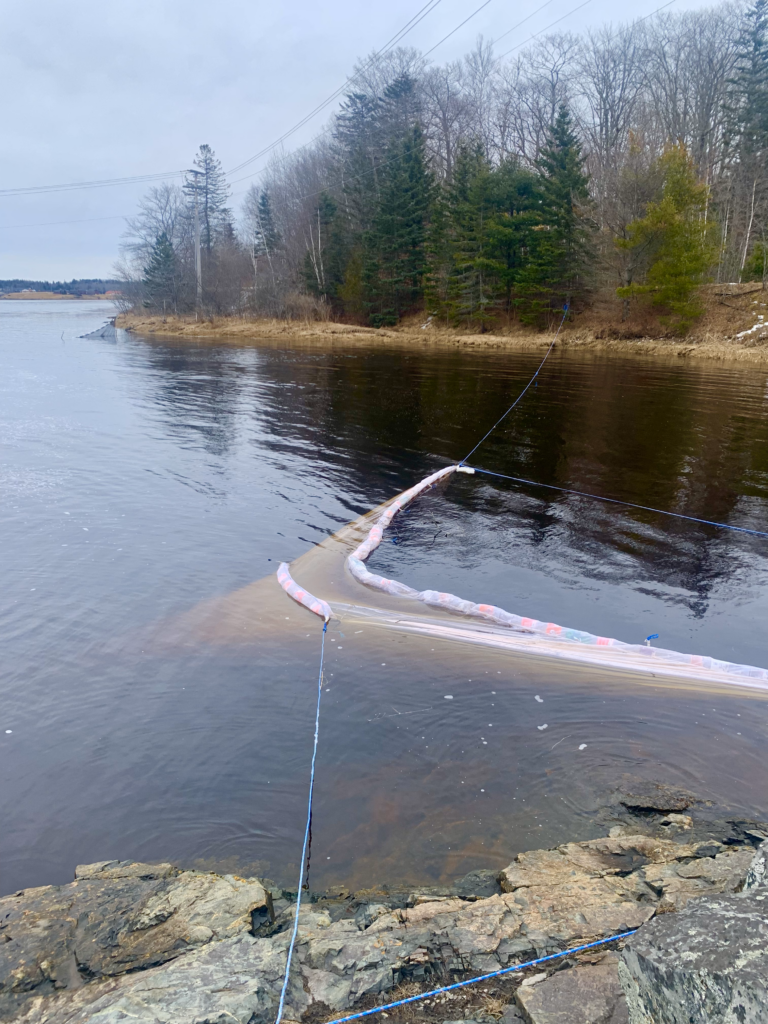
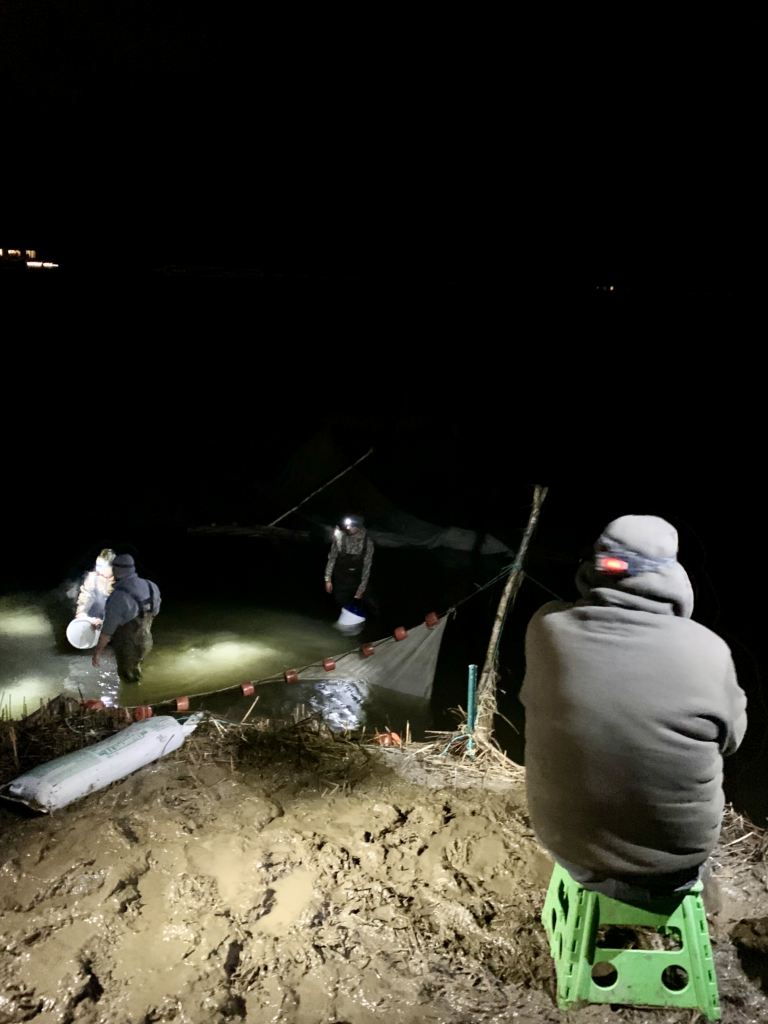
Stan roused our team at 3:00 am so we could begin our journey in Falmouth, where we spoke with Passamaquoddy elders and young harvesters while they set up their fyke nets and buckets to catch baby eels or “elvers.” Elvers are tiny translucent ray-finned fish, with black beady eyes, and are an inch in length. Eels in this region migrate from the Sargasso Sea, swim upstream into rivers to reproduce, and as the elvers make their way downstream where the river meets the sea, eel harvesters wait patiently for them to swim into their nets.
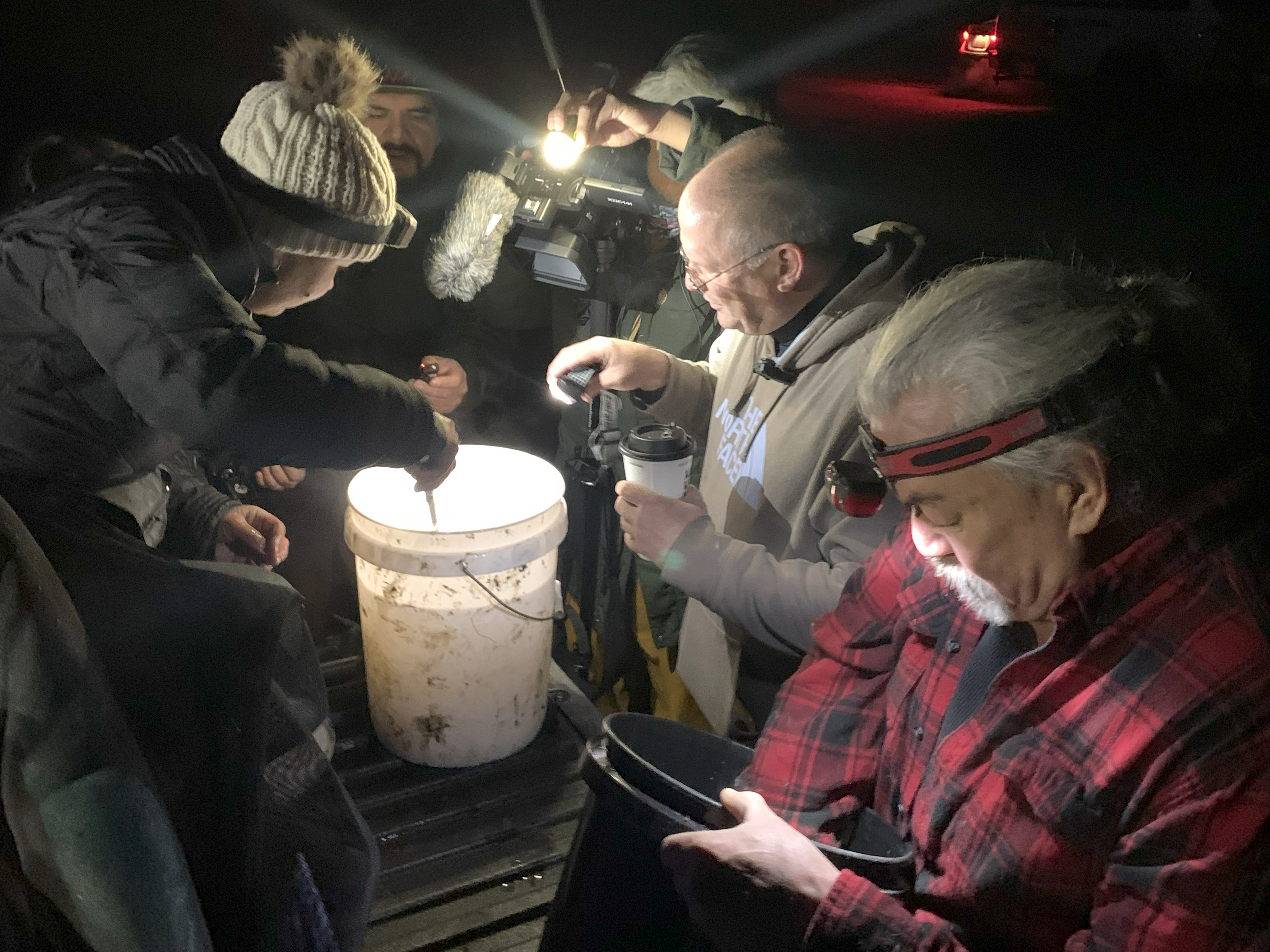
Once the elvers are caught, they are sorted by hand to weed out sand fleas, other sediments, and elvers that don’t meet buying standards. The harvesters sell the elvers to state-regulated dealers for $1,800+ per pound, who then sell them abroad or to the newest domestic competitor; American Unagi. Two years ago, elvers were sold at a market rate of $1,000 per pound – an unlivable wage. Stan explained, “Eels are the historical staple of our tribe. We are unfortunately under the thumb of the state government, we don’t have sovereignty, and it has paralyzed us economically.” As a result of NDN Fund’s investment, the relationship between American Unagi and Indian Township, or the eel deal, has increased the domestic demand and market rates for local Passamaquoddy harvesters.
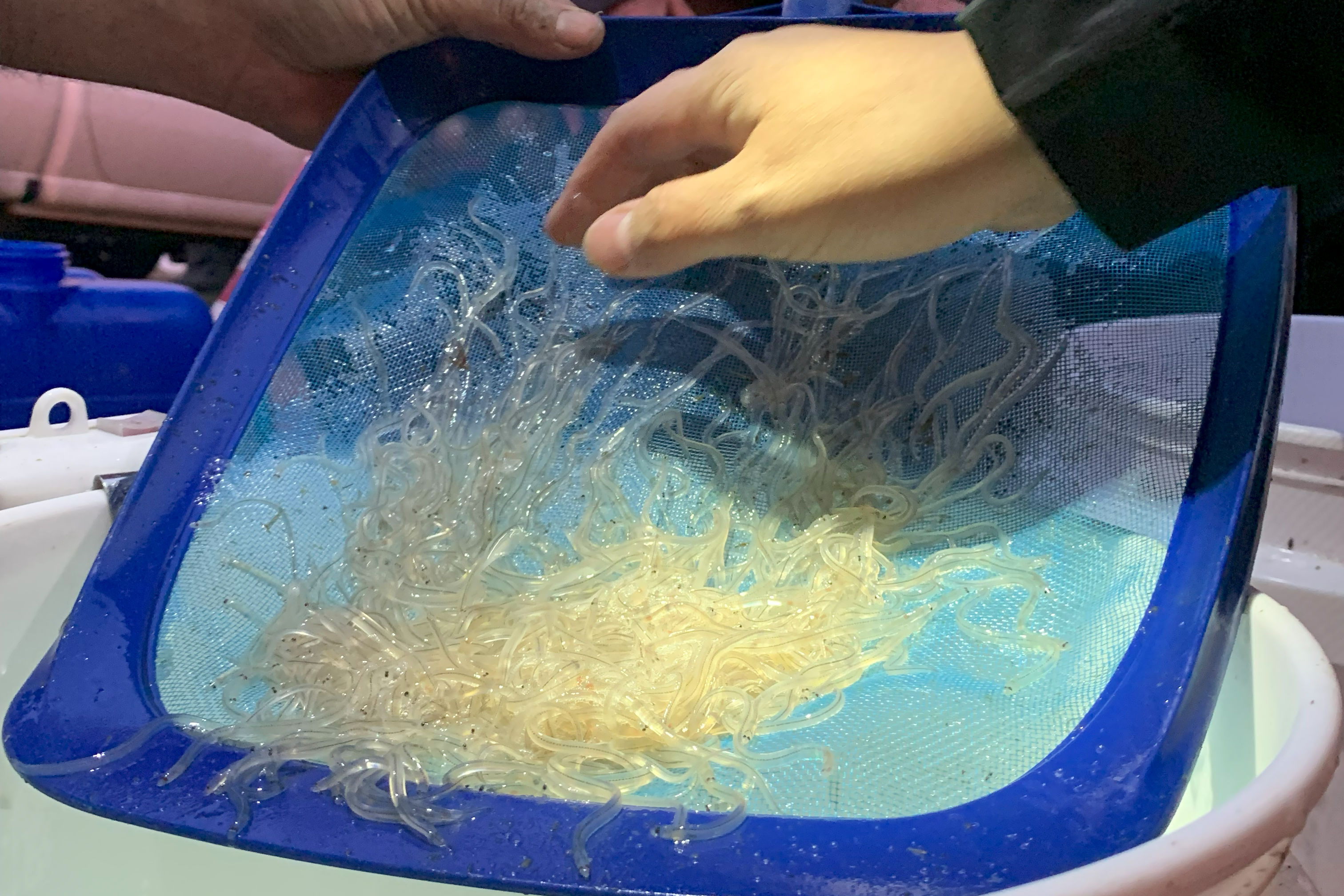
Alongside the economic benefits, the eel deal is bringing Passamaquoddy relatives back to the river. While some Passamaquoddy relatives have been catching eels for generations, others are returning to the river for the first time. We were privileged to speak with third-generation Passamaquoddy eel harvesters Matthew and Tony Dana. This year was Tony’s first year harvesting without their parents and they were overjoyed to learn they caught close to 11 pounds of elvers. Shortly after cleaning their elvers, the Dana family sold them to state-regulated dealers.
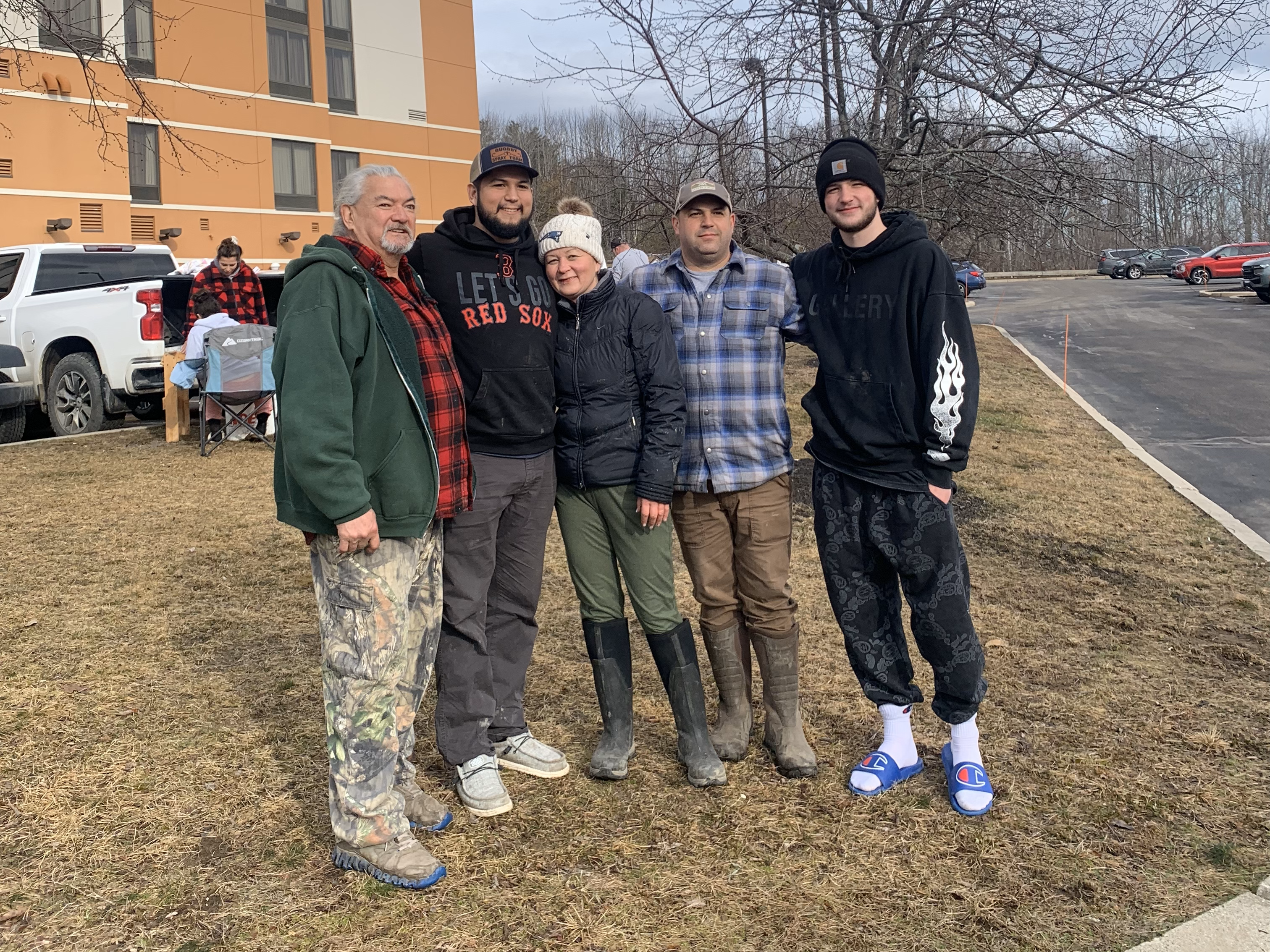
To learn more about what happened to the harvested elvers once sold, we met with the Founder of American Unagi, Sara Rademaker, at the eel aquaculture farm in Waldoboro. Sara mentioned that American Unagi buys elvers from local harvesters and under one roof sustainably grows, smokes, and packages eel products to sell internationally and across Turtle Island. This eel aquaculture farm facility has been implemented in Europe for years and is the first of its kind on Turtle Island.
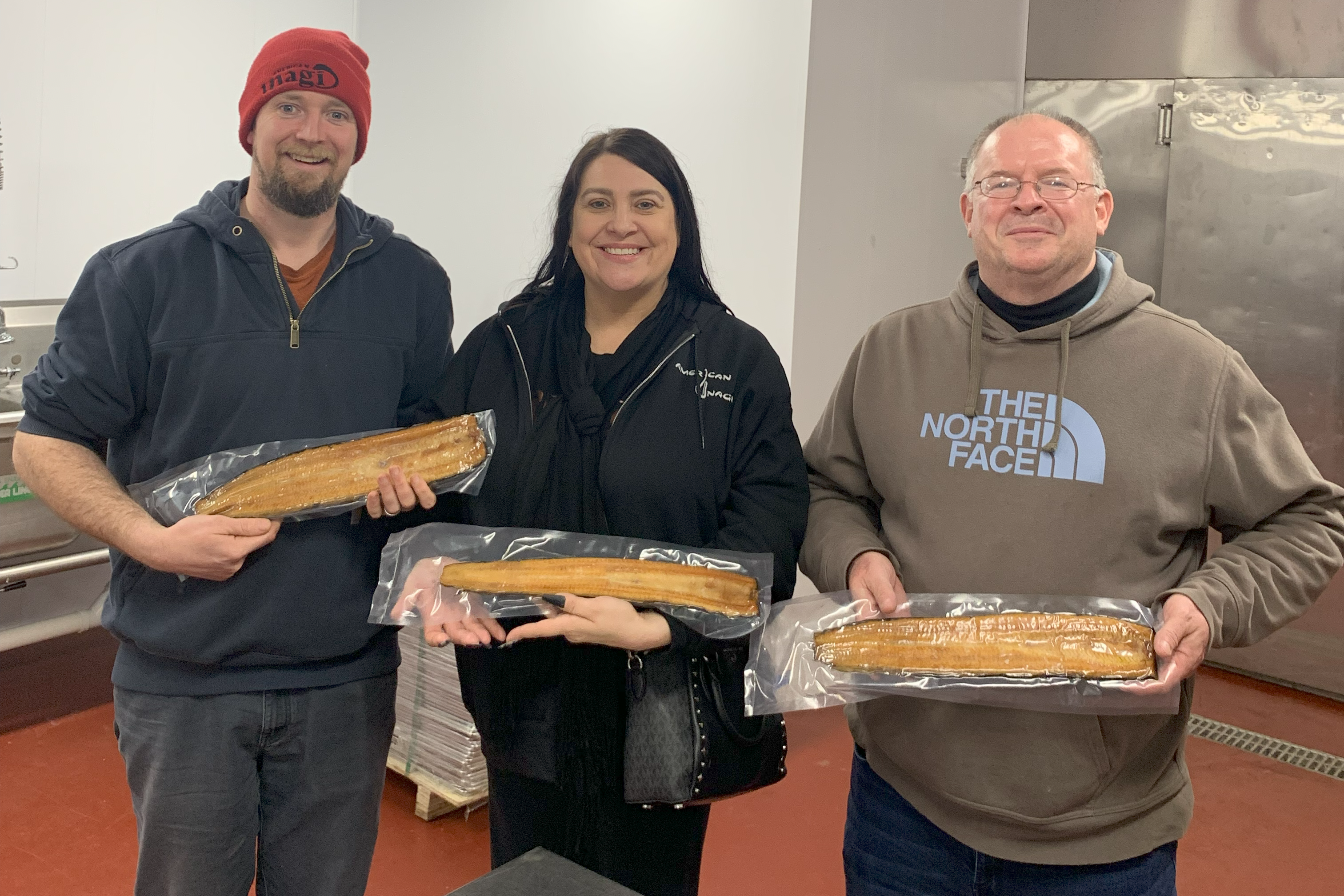
Stan explained, “We just thought, why are we allowing China to benefit when our tribe can supply right here in Maine.” Stan mentioned before the relationship with American Unagi was cultivated, just five years ago, all elvers harvested were sent abroad to be processed, primarily in China before being shipped back to Turtle Island after two or more years. Today, the whole process from the river to plate happens domestically, benefiting the local economy, driving up harvesting prices, and revitalizing this historic staple of Passamaquoddy tradition.
We toured the American Unagi eel farm and looked on as the elvers from last year’s catch were learning to feed themselves on demand. “Not a lot of fish can feed themselves,” Sara continued, “which helps with efficiency in feed use.” Pools of young black eels swarmed the feeder together in synergy. Sara stated, “Eels are very tactile, they like to be touching each other and be in dense groups. They are really happy in high density.”
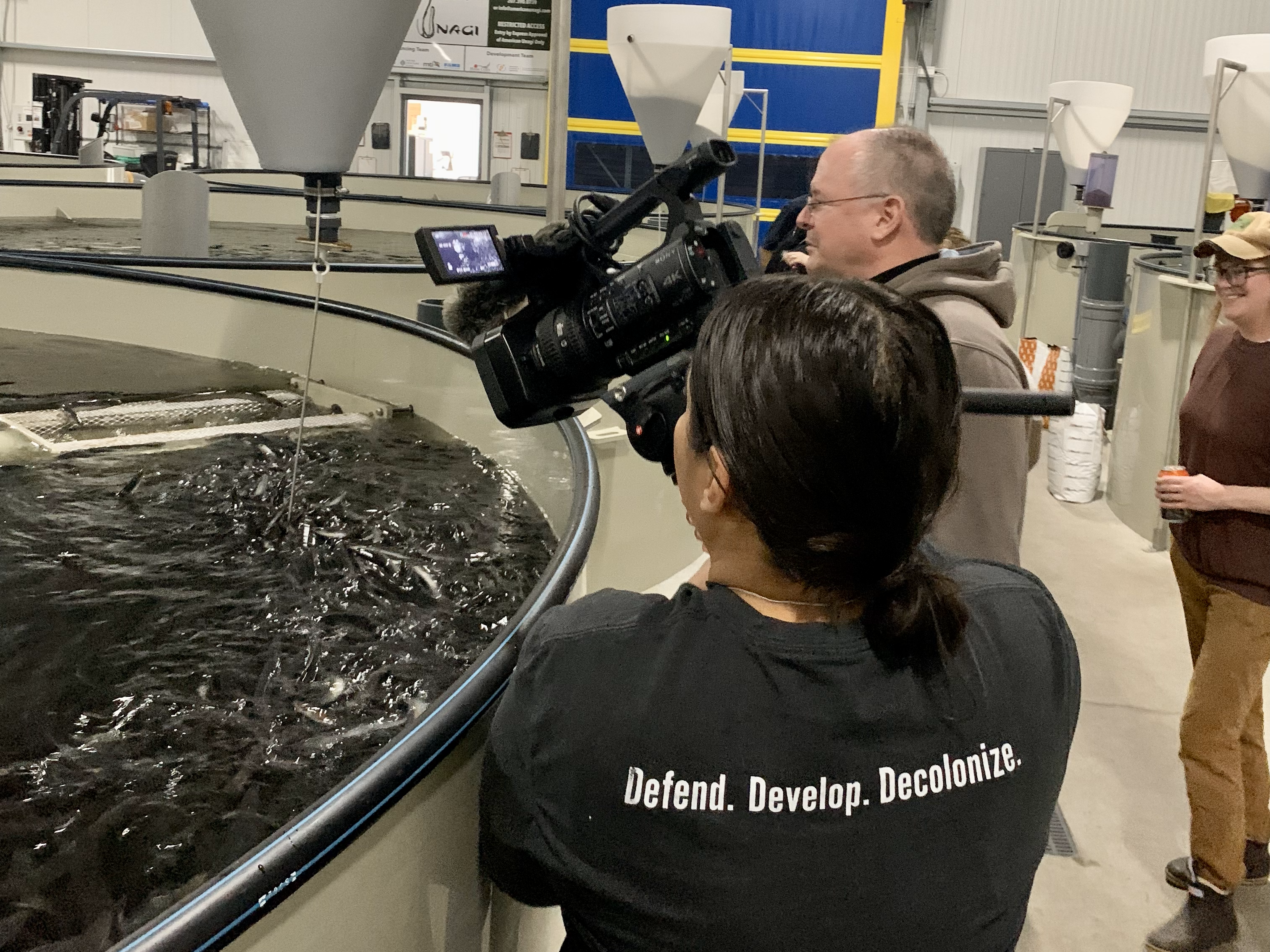
We then examined their eco-conscious waste management system. They utilize a biological filter that maintains the beneficial bacteria for the fish. The tank water used in the farm is recycled, cleaned, and saturated with oxygen every 20 minutes. “We pump the water once and it’s all gravity fed from there,” said Sara. American Unagi is working diligently to understand its energy inputs and outputs to remain a sustainable farm with a zero-carbon footprint. We ended the tour with a delicious feast of smoked and baked unagi.
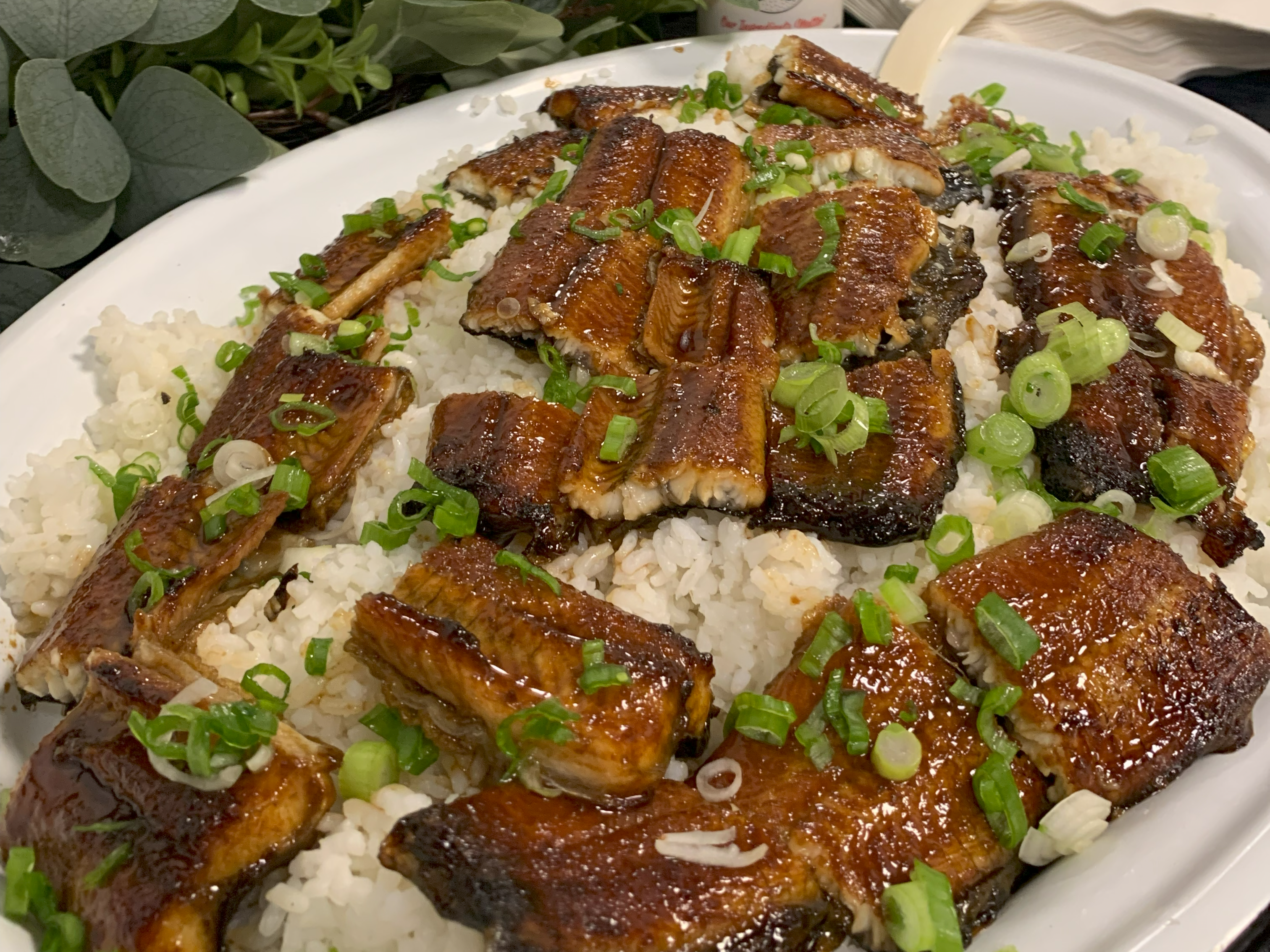
Wanting to learn more about the historic ties of eel harvesting and the Passamaquoddy people, we traveled to Princeton, where we were honored to visit the Passamaquoddy reservation. We listened to stories shared by Tribal elder, author, and historian, Donald Soctomah. Donald gave us a tour of the Passamaquoddy Cultural Heritage Museum and showed us cultural items dating back 10,000 years, including spears, petroglyphs, and baskets with eel depictions. “We have the largest concentration of petroglyphs on the east coast of North America, we have at least 800 petroglyphs,” said Donald. We also learned that after Passamaquoddy lands were stolen by settlers, they became hosts to the 1942 WWII German prisoner-of-war camps.
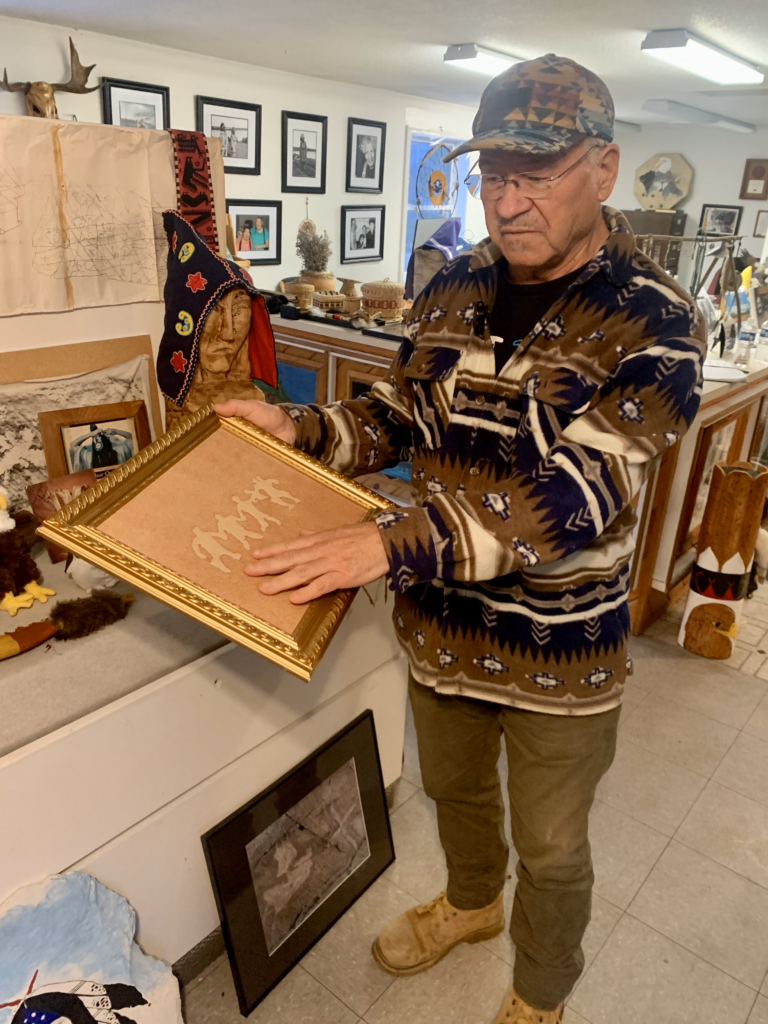
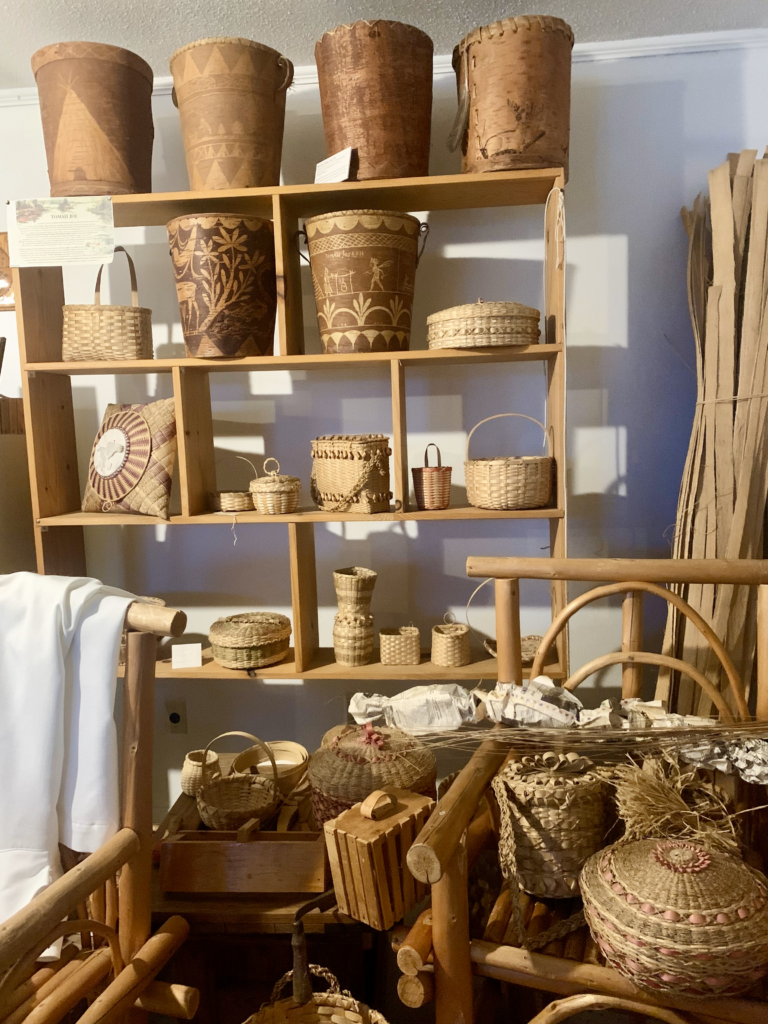
Before colonization, Passamaquoddy ancestors fished eels with spears or baskets; what we are seeing in Maine is an evolution of traditional practices. “For people to survive and keep your tradition, you have to you know, take in some of the new to adjust, for the better for the people, but keep your old tradition you know, handy and still utilize them,” Donald continued, “now our people are back out there harvesting the elvers so that tradition continues.” Donald explained how dams made migrating increasingly difficult for eels and other fish like salmon. The dams also interfered with the Passamaquoddy Tribe’s ability to partake in traditional ceremonies. Even with colonization and towering dam walls, eels were determined. Donald shared that he had once witnessed an eel inching its way up a dam wall.
What became increasingly clear along our journey, is that historians, elders, and eel harvesters emphasized that this eel harvesting season is a turning point for the Passamaquoddy peoples’ and regional tribal relatives. This eel deal has an impact greater than the economic benefits; it offers Passamaquoddy Tribe the ability to partake in their traditions and cultural practices. Alongside the economic, environmental, and cultural benefits, this project is an example of how Indigenous-led CDFIs can strengthen Indigenous-owned Businesses, Tribal Corporations, and Nations while serving as a source of healing from colonial financial systems.
Learn more about the Eel Deal by watching the full video of NDN Collective’s visit to Passamaquoddy territory
Learn More and Stay Connected:
- Interested in NDN CDFI lending and capacity building? Complete our eligibility form today.
- Follow Passamaquoddy Tribal Government – Indian Township on Facebook
